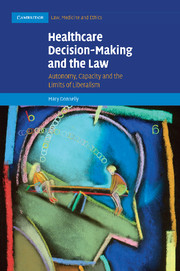Book contents
- Frontmatter
- Contents
- Acknowledgements
- List of cases
- List of legislation
- Introduction
- 1 Autonomy: variations on a principle
- 2 Autonomy in the law
- 3 Capacity: the gatekeeper for autonomy
- 4 Capacity assessment in practice
- 5 Autonomy, rights and decision-making for patients lacking capacity
- 6 Treatment for a mental disorder: a case apart?
- Conclusion
- Bibliography
- Index
- References
5 - Autonomy, rights and decision-making for patients lacking capacity
Published online by Cambridge University Press: 04 February 2011
- Frontmatter
- Contents
- Acknowledgements
- List of cases
- List of legislation
- Introduction
- 1 Autonomy: variations on a principle
- 2 Autonomy in the law
- 3 Capacity: the gatekeeper for autonomy
- 4 Capacity assessment in practice
- 5 Autonomy, rights and decision-making for patients lacking capacity
- 6 Treatment for a mental disorder: a case apart?
- Conclusion
- Bibliography
- Index
- References
Summary
A consequence of the legal and ethical fixation on autonomy has been a lack of conceptual engagement with the position of people who cannot make autonomous decisions. Thus, while one can neatly trace the philosophical lineage of the right of the capable patient to refuse treatment, it is much more difficult to identify a solid philosophical basis for healthcare decision-making for people who do not have capacity. In the absence of an independent theoretical model, the law traditionally dealt with decision-making for people lacking capacity using one of two unsatisfactory approaches. On the one hand, courts in England and Wales viewed a finding of incapacity as justifying a return to full-scale paternalism, where treatment decisions could be made on the basis of the patient's best interests with few safeguards and little analysis. The second approach, preferred by courts in the United States, has been to attempt to extend the principle of autonomy, notwithstanding the patient's lack of capacity, through the application of a substituted judgment standard based on what the patient would have wished had she had capacity notwithstanding, in some cases, very limited evidence of the patient's likely views or preferences. In England and Wales, this unsatisfactory position has begun to change. The Mental Capacity Act 2005 (MCA) contains provisions that allow people to make advance healthcare decisions and which require efforts to be made to facilitate participation by the person lacking capacity in the decision-making process.
- Type
- Chapter
- Information
- Healthcare Decision-Making and the LawAutonomy, Capacity and the Limits of Liberalism, pp. 176 - 224Publisher: Cambridge University PressPrint publication year: 2010

